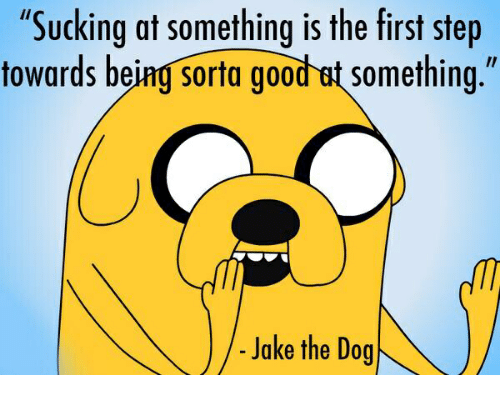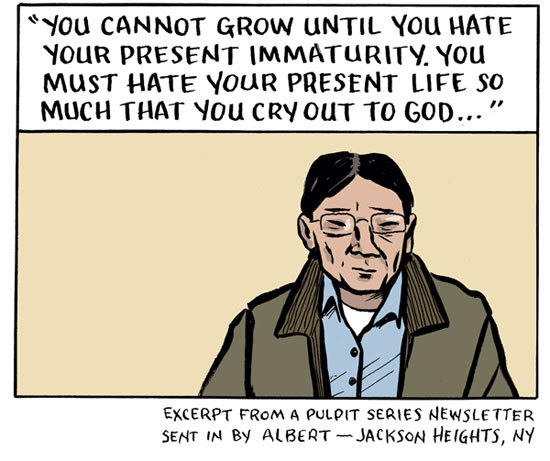 tag/selfhelp
tag/selfhelp
2005.07.18
This morning, musing about some of the recent sidebar talk about video games and other distractions, it occurred to me that it's a decent thinking point, but might be better if it was less blunt, more true-to-life. Hypothesis: "True Happiness" requires an alignment of happiness and meta-happiness. You want to be happy in "real time": entertained or just content. You also want to be happy "for the right reasons", happy in ways that seem philosophically or socially acceptable.
Something that works at the base "plain happiness" level but not above that is a "guilty pleasure". I don't think we have as good a label for the opposite, but I think many of us have felt that "I want to like this more that I actually do" feeling...when I was a pre-adolescent I tried to foster an appreciation for classical music and later jazz but in reality I didn't really have a feel for either. It took me years to admit myself I only like either when it's fast, has a lot of percussion and/or "hooks".
I guess there's a choice to be made, assuming we're not lucky enough to have the two levels in perfect alignment but smart enough to be bothered by that:
- do what you find entertaining and satisfying in the here-and-now and work towards a "philosophical" justification for that
- set out doing what you think you "should" do and hope for the trickle down in "actual" happiness.
In practice, for guys in modern times the base happiness level often involves following "adolescent" pursuits like video games or even skirt chasing. The meta-happiness involves "growing up", getting a good career, being a good family man. (In its negative sense, being a "geek" (in the Star Trek-lovin', fat slob never-talk-to-a-girl-without-a-credit-card stereotype) is all about the former without being tempered by the latter, and society is pretty damn harsh on that path.)
For me right now, it seems like I'm more inclined to stake out the former path; do what I like, then figure out the justifications. My key to fostering a sense meta-satisfaction from my pursuits is that they are some times "creative" (or, rather, "creationary") and the idea of "creating" ranks highly on the meta-level. I play video games (not as much as I used to) but I also create games. (Though I've also developed some pretty decent justifications for why gaming interests me so much.) Kisrael.com also provides a framework for two other pursuits of mine, musing and browsing, and lets me produce a tangible reward for it, something that other people seem to enjoy as well.
What about being a family man? I don't know. I understand that it can entail a giant sacrifice of most of those "trivial pursuits". I've also been told that having a child the most cosmic thing a guy can do, I guess the meta-satisfaction is so overwhelming that it gushes over into the base levels of happiness. That seems like a giant leap of faith though, and I've never been crazy about irrevocable choices that pursuing that life would entail. On the other hand, I know I've enjoyed working with kids, seeing how their minds work, teaching them and also witnessing the world through fresher eyes.
Philosophically it's almost a dead heat; my tendency towards anxiety and a cheerful nihilism makes it easy to explain not wanting to bring a child into this world. On the other hand there's a fear of long term regret, that some day I'll look at my amusements and accomplishments and ask "was that all worth it?"
Well, let me know what you think. (Interestingly, there are very Google few hits for "meta-happiness" or "meta-satisfaction", either given as one word or two. Is there another word for the concept that I'm not thinking of, or is it relatively uncharted territory?)
2019.07.18
In a nutshell, he's saying that the "10,000 hours" rule is over applied - it talks about the people at the tiptop of a specialty, pressing on to an elite place way out on the learning curve. Kaufman argues how 20 hours is often enough for a solid amount of competence.
It's a great point! Reminds me of Jake the Dog:

But those 20 hours are not a walk in the park. Kaufman ends with the slide:
The major barrier to skillAnd then he says
acquisition isn't
intellectual...
it's emotional.
We're scared. Feeling stupid doesn't feel good. In the beginning of learning anything new, you feel really stupid.Especially for people with Fixed Mindset - folks so skilled at finding low hanging fruit of stuff that are variants on what they're already good at, and so much in the habit of moving on and considering the difficult task unimportant - those 20 hours are going to be a slog! And 20 hours is a longer time than might first appear, especially if you're setting aside big swaths of dedicated focused and thoughtful practice...
You might want to cmd-+ or ctrl-+ your way to zooming this to 200% to take it in, but a Magic Eye of Bob "Church of the SubGenius" Dobbs in ASCII is pretty amazing....
BOBoBoBoBoBoBOBoBoBoBoBoBOBoBoBoBoBoBOBoBfNoRdBoBOBoBoBoBoBoBOBoBoBoBoBoBOB !!!!!!!!!!!!!!!!!!!!!!!!!!!!!!!!!!!!!!!!!!!!!!!!!!!!!!!!!!!!!!!!!!!!!!!!!!! !::::'___`:::::::'___`:::::::'___`:::::::'___`:::::::'___`:::::::'___`::::! !:::'/_ _\`:::::'/_ _\`:::::'/_ _\`:::::'/_ _\`:::::'/_ _\`:::::'/_ _\`:::! !:::|/ ~ \|`::::|/ ~ \| `::|/ ~ \|' `|/ ~ \|::' |/ ~ \|::::'|/ ~ \|:::! !:::|'-.-`| :::|'-.-`| :|'-.-`| |'-.-`|: |'-.-`|::: |'-.-`|:::! !:: (|e|e|? ::(|e|e|? ' (|e|e|? ` ' (|e|e|? ` (|e|e|?.: (|e|e|? ::! !. `._^_,'' :`._^_,'..' `._^_,'`...'`._^_,' `..`._^_,'. ``._^_,' .! !. \\=// \\=// \\=// \\=// \\=// \\=// .! : U/_/ U/_/ U/_/ U/_/ U/_/ U/_/ : @/ \&~ @/ \&~ @/ \&~ @/ \&~ @/ \&~ @/ \& Y/\.::./\S\ /Y/\.::./\S\ /Y/\.::./\S\ /Y/\.::./\S\ /Y/\.::./\S\ /Y/\.::./\S E$$$$$$$$$$$$$$$$$$$$$$$$$$$$$$$$$$$$$$$$$$$$$$$$$$$$$$$$$$$$$$$$$$$$$$$$$E %%%%XX%%%%%%%%%%%XX%%%%%%%%%%%XX%%%%%%%%%%%XX%%%%%%%%%%%XX%%%%%%%%%%%XX%WiZ
So near the 50th anniversary of the moon landing, lets not forget the software engineer who made it possible - she has some lessons for the coders of today
You know how you can make America great again? Tell Donald Trump to go to hell. [...] He's a race-baiting, xenophobic, religious bigot.
Back in the day you could get something called "Weslyan Tetris" for Macs... it had really annoying sound clips that would comment on your performance, and then sometimes it would "nyah nyah nyah" and cheat...
As soon as we started programming, we found to our surprise that it wasn't as easy to get programs right as we had thought. Debugging had to be discovered. I can remember the exact instant when I realized that a large part of my life from then on was going to be spent in finding mistakes in my own programs.
2019.11.08
He solicited letters during his Internet-fasting-process, and the article has some of those turned into comic panels. This one struck me:

It reminded me of my estranged debate partner and friend EB, whose frustration at himself and me for our respective bad habits was sometimes palpable - and to be fair, he was pretty good at making mindful choices and exclusions to cultivate his life.
For me and my fixed mindset, it’s weird, the feeling of self-hatred referenced in the comic is more “you can’t grow unless you declare your previous self an idiot for getting yourself into these patterns in the first place"… but your previous self was probably about as smart as you are now! (See Tallulah Bankhead's "If I had to live my life again, I'd make the same mistakes, only sooner.")
Obviously that fixed-mindset stance excludes the whole “learning from experience” possibility and is therefore kind of stupid… but recognizing that there were better decisions that could have been made earlier requires a judginess I find difficult to muster for other people, much less myself.
(Compare to EB, who judges freely and often, with great and often justified confidence, but some terrific misses -- bold misjudgements. For me, a fear of such misjudgements - that I asserted my subjective viewpoint over somebody else's, and was unjust and unempathetic and wrong to do so - keeps me from judging much in the first place.)
I mean when you look at your current habits and how they were formed - you can guess it would have been better to have lived otherwise, but you don’t know, and so the mandate for mustering the willpower to make a change is that much less…
This all brings to mind one final quote, also from an autobiographical comic:
Sure it mattered. When you get to my age you discover that everything mattered. Life isn't a series of good and bad choices. It's harder to steer it one way or the other than most people think. You just get pulled along. You look back and you wonder 'could I have changed the course of my life?' Maybe you could've ... but it would probably have taken a tremendous force of will.
Following up on that to EB:
I guess you and I would both agree incorrectly judging something is wrong - especially when you're forcing your opinion over someone who ends up being correct. But for you it's an acceptable (and necessary) cost of doing business, and hopping to the meta-level, endlessly not judging can be judged to be a bad life pattern as well. All while my delicate ego keeps me as far away from being incorrect as possible and only asserting things I am overwhelmingly confident about.
My first attempt at jogging was in middle school- I think to try and improve my gym class grade or something, around the hallways of the school. I remember the gym teacher responsible for that discouraging me from listening to music on a walkman, citing something about blocking alpha or beta waves or what not. Was there something to that or was it just new-age-y hokum?
Content Warning: Diet and Food Stuff
(I have at least one friend who reacts badly to this stuff, so, fair warning.)
Realizing calorie counting works better than good-intentioned food journaling.... Kind of obvious, I suppose. But part of my fluffy cloud of economic privilege is that I measure the cost of food in calories not dollars - and so given that the lunches and snacks at work are free to me dollar wise, I guess I need the accountancy of quantifying the calories, rather than trying to juggle my good intentions against my random hungry impulses.
Calorie counting that for a few days - even though I have to guess, or go out for a Blaze pizza or Chipotle salad not for nutritional reasons but because I can have higher confidence estimates of the calories - has given me a satisfying feeling of control (which I know is a fraught thing for people with more serious food issues.) In fact, I'm able to have more generous evening meals because I know what the numbers are.
And without calorie counting... it's like "all this food is free! In both money and calories! So why not?"
I know my "calorie is a calorie is a calorie" thinking is naive - diets create responses in our metabolism, and the other part of the game is figuring out satiation within that calorie limit - but this kind of math is the only thing I've found to work for me, in the 4 times I've lost 10-15 lbs over the past decade and a half. ( diet.kirk.is for the graph)